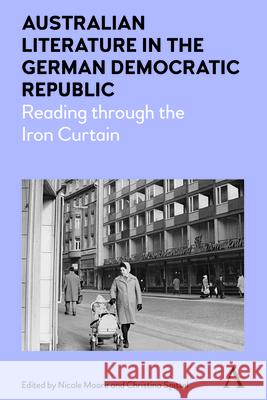Australian Literature in the German Democratic Republic: Reading Through the Iron Curtain » książka
Australian Literature in the German Democratic Republic: Reading Through the Iron Curtain
ISBN-13: 9781783085231 / Angielski / Twarda / 2016 / 274 str.
Australian Literature in the German Democratic Republic: Reading Through the Iron Curtain
ISBN-13: 9781783085231 / Angielski / Twarda / 2016 / 274 str.
(netto: 343,70 VAT: 5%)
Najniższa cena z 30 dni: 356,48
ok. 30 dni roboczych.
Darmowa dostawa!
Exploring the imaginative construction of the post-colonial South by the communist East, this is a multi-faceted, collaborative study of the reception of Australian literature in the German Democratic Republic. An account of fraught and complex cross-cultural literary exchange between two highly distinct, even uniquely opposed reading contexts, this study has resonance for all newly global reckonings of the cultural Cold War. Australian Literature in the German Democratic Republic is an investigative expose of Australian literature's revealing career in East Germany. Working from the extraordinary records of the East German publishing and censorship regime, the authors materially track the production and reception of one country's corpus as envisioned by another. The 90 Australian titles published in the GDR form an alternative canon, revealing a shadowy literary archive that rewrites Australia's postwar cultural history from behind the iron curtain. Cast as a geo-political conundrum - beautiful and exotic, yet politically retrograde - Australia was presented to East German readers as an impossible, failed utopia, its literature framed through a critique of Antipodean capitalism that yet reveals multiple ironies for that heavily censored, walled-in community. This book brings together leading German and Australian scholars in the fields of book history, German and Australian cultural history, Australian and postcolonial literatures, and postcolonial and cross-cultural theory, with emerging writers currently navigating between the two cultures.
An account of fraught and complex cross-cultural literary exchange between two highly distinct - even uniquely opposed - reading contexts, Australian Literature in the German Democratic Republic has resonance for all newly global reckonings of the cultural cold war. Working from the extraordinary records of the East German publishing and censorship regime, the authors materially track the production and reception of one countrys corpus as envisioned by another. The 90 Australian titles published in the GDR form an alternative canon, revealing a shadowy literary archive that rewrites Australias postwar cultural history from behind the iron curtain and illuminates multiple ironies for the GDR as a reading nation. This book brings together leading German and Australian scholars in the fields of book history, German and Australian cultural history, Australian and postcolonial literatures, and postcolonial and cross-cultural theory, with emerging writers currently navigating between the two cultures.











